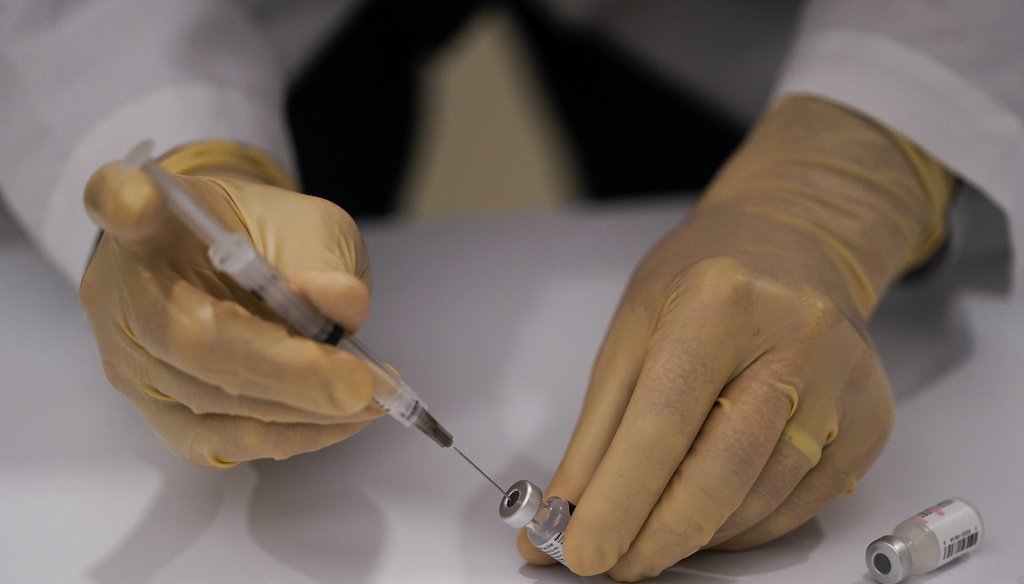Stand up for the facts!
Our only agenda is to publish the truth so you can be an informed participant in democracy.
We need your help.
I would like to contribute

In this Dec. 14, 2020, file photo, David Cheng, director of inpatient pharmacy, prepares the Pfizer-BioNTech COVID-19 vaccine at Kaiser Permanente Los Angeles Medical Center in Los Angeles. (AP)
If Your Time is short
-
Facebook videos show women shaking and convulsing, saying it was caused by coronavirus vaccines. In one, an Indiana woman claims to have taken the Moderna vaccine. In another, a Louisiana woman says she took the Pfizer shot.
-
Health officials haven’t confirmed that either case was caused by the vaccine. With 51 million doses of the vaccine administered globally so far, medical research has not identified these symptoms as side effects of the vaccine.
-
Health experts say people need to report any reactions so their cases can be investigated, but cautioned against drawing conclusions from any singular event.
Videos circulating on Facebook and other social media purport to show women shaking violently after receiving the coronavirus vaccine.
The videos highlight the cases of two people who say they received two different COVID-19 vaccines.
The posts were flagged as part of Facebook’s efforts to combat false news and misinformation on its News Feed. (Read more about our partnership with Facebook.) PolitiFact wanted to know more.
While both women say in the videos that they blame the shots for their conditions, experts have not verified the vaccines as the cause of either’s shaking. Additionally, with more than 51 million doses of the vaccine having been administered globally — 16.3 million in the U.S. — the symptoms described in these viral videos have not been among possible side effects noted by medical researchers.
Let’s go through these cases one at a time.
Sign up for PolitiFact texts
The woman in pink
Shawn Skelton is an Indiana woman who claims that she suffered from uncontrollable shaking after taking the first round of the Moderna vaccine.
In one of her videos, a pink-clad Skelton is seen gyrating on a bench. She claims she received the vaccine on Jan. 4 — a Monday.
"By Thursday morning, I was in full body convulsions," she said. "There’s nothing that will convince me that this is not from the Moderna vaccine."
Since her video was posted, she’s been treated and released from Deaconess Orthopedic Neuroscience Hospital, according to the Evansville Courier & Press newspaper.
Skelton said an MRI, CT scan and blood cultures yielded no answers. According to her fiance, doctors told Skelton her problem is likely stress-related. The CDC told the Courier & Press that Skelton’s symptoms aren’t common in people who’ve taken the vaccine.
PolitiFact reached out to Skelton on Facebook, but hasn’t heard back. In a Facebook post on Jan. 18, she said she’s raising money to help pay for treatment.
Mom in Louisiana
Another set of videos show a woman struggling to walk across a hospital setting because she’s shaking violently.
The woman is Angelia Gipson Desselle of Louisiana, and many of the videos were promoted by her son, Brant Griner, who tagged his mother on Facebook when he posted them. Griner also posted videos of himself responding to critics, which had also been viewed thousands of times before he removed them on Jan. 19.
PolitiFact reached out to Desselle and Griner. Desselle didn’t respond, but Griner spoke to a reporter for 30 minutes Jan. 15. He said his mom, 45, was eager to get a COVID-19 vaccine because she works at a medical clinic. Griner said she got it on Tuesday, Jan. 5, in New Orleans.
"And on Friday is when she started having seizure-like sensations in her left leg," Griner said in a phone interview. "By Saturday, she couldn’t hardly walk. And that’s when she got admitted to the hospital."
PolitiFact wanted to verify that Desselle took the vaccine and follow up with medical professionals about what might have caused her symptoms. Griner declined to say where his mother received the vaccine, where she was admitted to the hospital or which doctors she spoke with.
Information lacking
Griner said that after he posted the videos, he received feedback from many social media users, including some who he says have been harassing him and his mom. He said Desselle wants to prevent critics from harassing the medical professionals involved in her treatment.
On Jan. 19, PolitiFact reached out to the clinic where Desselle is employed to ask if they administered the vaccine and if anyone else suffered side effects. The employer hasn’t responded.
Later that day, Griner removed videos of his mom from his Facebook page. He texted a reporter: "My mom's boss and (coworkers) are getting harassed and she has requested me to remove all the videos and not talk to anyone else about it."
We don’t know what exactly caused Desselle’s reaction.
Her blood tests and brain scans were normal, according to Griner and Desselle in a now-deleted video. Also in that video, Desselle mentioned a condition called Wolff-Parkinson-White syndrome, which can lead to an irregular heartbeat. It was unclear from the video if she has that condition or if doctors believe it played a role in her shakiness.
Kevin Litten, a spokesman for the Louisiana Department of Health, said state officials aren’t aware of anyone reporting severe convulsions or neurological side effects caused by the vaccine.
"We have only had one person that had a serious effect that warranted a hospitalization," Litten said. "The symptom was gastrointestinal distress and lightheadedness. That person was treated and released."
Jason McDonald, a spokesperson with the CDC, told PolitiFact in an email that the agency has "no adverse event data regarding a case of this nature out of Louisiana."
Online vaccine testimonials need scrutiny
Medical experts have cautioned that as more people get vaccinated, it is likely that more stories will surface of people claiming a number of side effects. The challenge for the public is determining what to make of these testimonials.
As of now, whether these symptoms were brought on by the vaccines remains to be proven. But if they were, they aren’t considered common. Public health officials and vaccine experts told PolitiFact they are not aware of any link between either COVID-19 vaccine and uncontrollable shaking.
Dr. Paul Offit, director of the Vaccine Education Center at Children’s Hospital of Philadelphia, who also sits on the Food and Drug Administration’s vaccine advisory committee, said he hasn’t heard of this being associated with the vaccines.
Dr. Shiv Pillai, director of the Immunology Graduate Program at Harvard Medical School, also said he wasn’t aware of any adverse vaccine reactions involving shaking. He said that some people have muscle aches and feel tired about a day after the second dose, but that it usually settles in less than 24 hours.
That squares with official findings by the FDA and the CDC. In Pfizer’s and Moderna’s clinicals trials — which combined include over 37,000 people — vaccine recipients reported mild or moderate reactions, such as pain at the site of injection, as well as fatigue, headache, fever and joint and muscle pain. But these are described to be short-lived, typically resolving without complications in a day or two.
Health experts say the issue of coincidence versus causation is common when you give vaccines to a large number of people, especially adults. As opposed to children, who are by and large healthy, many adults take medications or have underlying illnesses that can put them at greater risk for health events.
Dr. William Schaffner, a professor and infectious disease expert at the Vanderbilt University School of Medicine in Nashville, Tenn., told PolitiFact the most important thing for people to do is to report any reactions so their cases can be investigated. But he cautioned against drawing conclusions from any singular event.
"When information comes in, it’s under constant review by the FDA and CDC, because you can’t conclude from an individual event that the vaccine caused the occurrence, but you have to investigate it further," Schaffner said. "You have to distinguish things that are coincidental from what's causal. We know that some things are going to happen, and somebody will think there’s some relationship to an event, which is not to say that there might not be, but those things must be investigated first."
He added that he has not seen any shaking or related reactions in the over 20,000 doses given at his medical center so far.
"COVID-19 vaccines are safe and effective," said McDonald, the CDC spokesperson. "Many people don’t have any side effects after COVID-19 vaccines, but some people will have pain or swelling at the injection site or fever, chills, or a headache. These typically don’t last long and are signs that your body is building protection."
The CDC recommends that people who have had adverse reactions to other shots in the past consult a physician before getting the vaccine. The agency says that clinical trials demonstrated that the Pfizer vaccine, for example, would be effective and safe for those with underlying medical conditions, and is especially important for those who are at an increased risk for severe COVID-19.
The vaccine is not recommended for those who have had a severe allergic reaction to an injectable product in the past, but it’s OK for people with other types of severe allergies, as long as they take precautions.
"So, for example, people commonly have peanut allergies, or egg allergies, or other food allergies, you still can get this vaccine," said Offit. "You just need to wait for 30 minutes in the area where you’ve gotten that vaccine so, if you do have an allergic reaction, somebody will be able to give you a shot of epinephrine to reverse it."
For everyone else, health officials recommend hanging around for about 15 minutes following inoculation to monitor for any reactions.
Our Sources
Facebook post, Jan. 13, 2021
Facebook post, Jan. 14, 2021
Facebook post, Jan. 14, 2021
Facebook post, Jan. 18, 2021.
Health Impact News, "Louisiana Woman Convulses Uncontrollably after Being Injected with the Experimental Pfizer COVID Shot," Jan. 13, 2021
Evansville Courier & Press, "CDC says vaccine side-effects 'tend to be mild' in response to Indiana woman's claims in viral video," Jan. 12, 2021.
Poynter.org, Reporting on the COVID-19 Vaccines, Dec. 14, 2020
Centers for Disease Control and Prevention, Use of Pfizer-BioNTech COVID-19 Vaccine: Clinical Considerations, Dec. 12, 2020
Telephone interview with Brant Griner, who posted videos on Facebook of Angelia Gipson Desselle.
Telephone and email interviews with Kevin Litten, a spokesman for the Louisiana Department of Health.
Telephone interview with Tim Couret, administrator for West Bank Surgery Center.
Email interview, Dr. Paul Offit, director of the Vaccine Education Center at Children’s Hospital of Philadelphia, Jan. 19, 2021
Email interview, Dr. Shiv Pillai, director of the Immunology Graduate Program at Harvard Medical School, Jan. 19, 2021
Phone interview, Dr. William Schaffner professor and infectious disease expert at the Vanderbilt University School of Medicine, Jan. 20, 2021
Email interview, Jason McDonald, spokesperson with the Centers for Disease Control and Prevention, Jan. 20, 2021









































